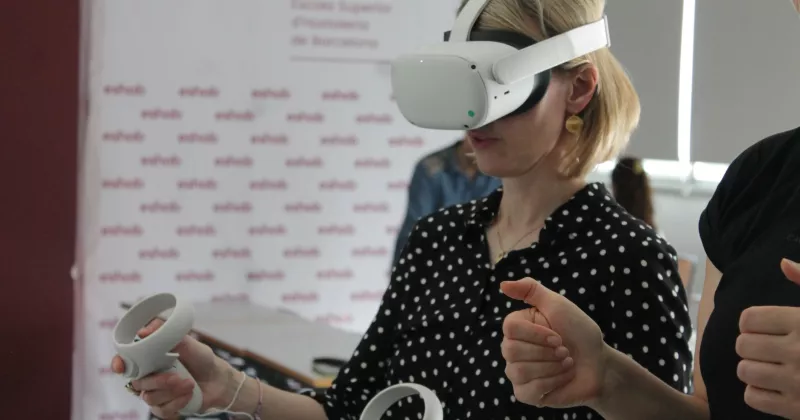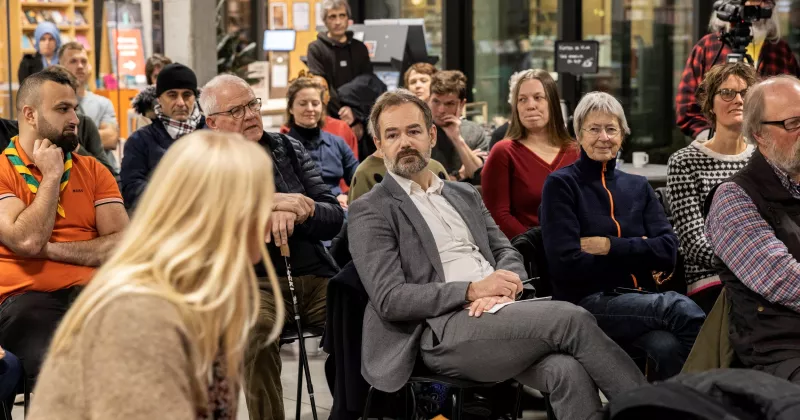Tessa Keymeulen: Dealing with changes

Short Bio
I am an employee experience partner at Metagenics, a manufacturer of high-quality micro nutrition. The head office for the EMEA Group is in Ostend, but we also have offices in Italy, France, the UK, and the Netherlands. I was a customer service representative at Beaulieu, a world leader in flooring and material solutions. I studied multilingual communication at Ghent University. I aim to develop myself as much as possible to grow to do my job better and better serve our employees with my expertise.
My Story
As an employee experience partner, I am responsible for everything related to L&D, internal communication, and events. With a view to the future and the rapidly changing market in which our company operates, I am working hard at Metagenics on a learning culture in which employees take their learning and development into their own hands. Since we became a part of a big investment company, several of our departments have become 'global,' including L&D. Of course, that impacted my job. After the takeover, it was a bit uncertain whether we could still organize some things locally. Fortunately, there were quite a lot. I am responsible for writing the learning policy for the entire EMEA Group, about 450 people, including both blue and white-collar workers. I coordinate training courses and sometimes teach them myself. I also make sure our learning policy is supported by everyone in our organization, in close collaboration with the Global Head of L&D in Australia. Each country has local needs, and each region also has specific needs. Of course, we want our policy to align with our global policy.
For Metagenics, it is a must to focus on lifelong learning. Personal and professional growth is paramount, and we really encourage this. Our mission is to help people do their jobs even better and make sure they are allowed to develop the skills of the future. Organizations that invest in lifelong learning can attract talented people more easily. It also ensures that employees remain happily employed longer. We want to put our employees in charge of their personal and professional growth and development. L&D provides the necessary tools, the coordination, and the organization of training, but we expect the employees to take the initiative and the responsibility themselves.
We also are convinced that the managers have an important role in this: they can encourage employees to take training courses and – more importantly – follow up afterward and check whether what they learned gets translated successfully into practice.
We have now set up an Academy with modules and workshops at a global level, to which we will add several training courses and sessions at a local level as demand arises. The modules are always based on the company's global vision and strategy. I notice that some employees are more engaged in lifelong learning than others. It remains a challenge to ensure a learning culture that is accepted across the departments among all employees. After all, an important task is preparing our employees for the future. We want them to be able to do their job as well as possible tomorrow. Because society is changing a lot, but our company is also changing and growing, which will not be any different in the future. Our focus is always on the company's strategy and vision. There are 5 pillars that will receive focus in the coming years. One of these is digitization, e.g., in the form of e-commerce. Our employees must then, of course, have the skills to perform the tasks that come with this.
Trying to create such a general learning culture is still quite new, but we are working very hard on it, for example, by expanding our Academy and thus reducing the number of ad-hoc requests for training courses. We are also investigating how we can encourage our employees to take lessons or training after hours based on their interests. These courses don’t necessarily have to do with their job.
Once they get into the habit of continuous learning, it will also be easier to sign up for a course only for their job. I'm very convinced about this.
We installed an LMS system with different types of training, both in a classroom and e-learning. As in many companies, coronavirus has removed some barriers to digital learning.
Nevertheless, there is still a preference for classroom training because of the interaction it offers. At the same time, there are courses that we have to convert to e-learning because it is no longer feasible to organize them live in the long run. So, our people learn to deal with learning in different ways. We also organize Lunch & Learns. We don’t refer to this as 'education'. That’s why people are often more inclined to learn because it is informal. We try very hard to encourage that.
We work in a business that changes very quickly. Every year, we ask our employees what could help them perform better in their current roles. In our learning policy for the future, we do not rely much on specific trends in L&D. Still, we respond to the vision and strategy of our company and the needs of the market, within our company itself and among our employees. These aspects are guiding rather than tendencies or trends.
For our learning policy in the future, I want to focus more on coaches and mentors.
We already offer a lot of informal learning, but I would like to steer this a little more. I also want to focus on knowledge transfer and knowledge management. A lot of knowledge is in the heads of our employees. Knowledge transfer is already very good within our production environment. We are about 85% successful in passing on knowledge. Several workers mastered certain machines perfectly, but the knowledge disappeared with them when they left. They are now helping us to draw up digital work instructions, sheets, and the like to write down and film the knowledge they have… Some have also been through a train-the-trainer process and are already taking up a mentoring role. They are responsible for the reception, the tour, the training, and the follow-up with new employees based on a competence matrix. First, there is an assessment for people interested in becoming a trainer. We have developed our own Lego exercise in which we look at several competencies, including listening skills, contact skills, and transferring knowledge... Based on this, we determine whether someone has what it takes to become a trainer; on the other hand, we use this output to shape the training itself. Then we come together for a day for the actual training. In a later phase, I spend two hours with each trainer in the working environment to discuss how to provide concrete training in a production environment. I am very proud of this trajectory because it is completely custom-made by Metagenics.
The most important competencies with a view to the future?

This story was created in collaboration with Stimulearning, a membership organization where L&D professionals share ideas and questions and organize learning activities. Inge Delva from Ingenieus interviewed Tessa for the series 'Op de Praatstoel.'





